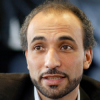Tariq Ramadan

Tariq Ramadan
Tariq Ramadanis a Swiss academic, philosopher and writer. He is the professor of Contemporary Islamic Studies in the Faculty of Oriental Studies at St Antony's College, Oxford and also teaches at the Oxford Faculty of Theology. He is a visiting professor at the Faculty of Islamic Studies, the Université Mundiapolisand several other universities around world. He is also a senior research fellow at Doshisha University. He is the director of the Research Centre of Islamic Legislation and Ethics, based in...
NationalitySwiss
ProfessionWriter
Date of Birth26 August 1962
CountrySwitzerland
I opposed the Fatwa against Salman Rushdie. I read the book and took a critical distance. I did not think The Satanic Verses is a blasphemous book. I did not consider the book as being a great read, but as an intellectual I read, I assess, and I respond. I make a difference between true freedom of expression to which we owe a response and provocation, which we ignore.
I opposed the Fatwa against Salman Rushdie. I read the book and took a critical distance. I did not think The Satanic Verses is a blasphemous book. I did not consider the book as being a great read, but as an intellectual I read, I assess, and I respond. I make a difference between true freedom of expression to which we owe a response and provocation, which we ignore.
Now no one can deny the fact that whatever is the state of the affairs in the country, you did not have the army controlling the country and you have a pluralistic society anyway.
You can’t be good to others if you’re not strict with yourself. The more shallow you are with yourself, the harsher you are with others. The more profound you are with yourself, the more generous you are with others
To have a moral sense is not to be dogmatic in dealing with rules. It can be an open way with dealing with questions of objectives and purpose, which is completely different.
Very often we talk about India and China, but not really Malaysia and Indonesia. The potential in the shift to the East is going to be great and very important for this country.
Never forget your dialogue with God, it is your strength.
While criticism of Israel is legitimate and justifiable, it cannot be an excuse - in any way, shape or form - for anti-Semitism.
Tell me what you are doing with your suffering, and I will tell you who you are.
Destroying the nation state are mainly three things: the global economy, global communication technology and global culture. And this is where we are lost in the process. What could be something that can provide us a transversal political sense of belonging? At the end of the day, without an alternative we end up with populism in the name of very narrow identities.
You can't say 'I don't do politics,' because silence is a political statement.
No one must ever let power or social, economic, or political interest turn him or her away from other human beings, from the attention they deserve and the respect they are entitled to. nothing must ever lead to a person to compromise this principle or faith in favor of a political strategy aimed at saving or protecting a community from some peril. The freely offered, sincere heart of a poor, powerless individual is worth a thousand times more in the sight of God than the assiduously courted, self-interested heart of a rich one.
We integrate the good wherever we find it.
Jihadists are acting against the interests of every single country.